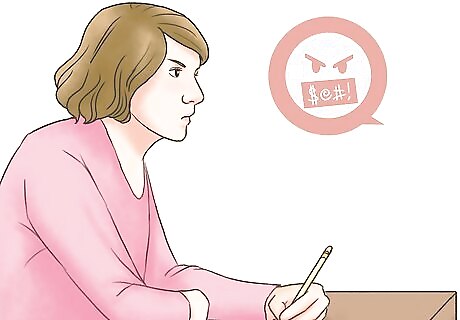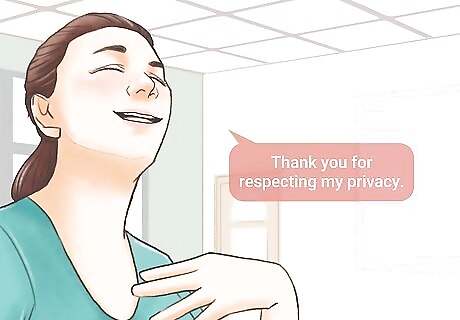
views
Assessing their Behavior

Write down what makes their behavior upsetting. In order to figure out what’s at the bottom of someone’s poor treatment towards you, you need to be able to clearly define what’s happening. Reflect on the way they treat you. What about their behavior makes you uncomfortable? Try to pinpoint clear and specific details about their behavior. Write down what details you notice about their behavior. For example, perhaps whenever you speak to them, they ignore you. Write out exactly what happens.

Put yourself into the other person's shoes. Think about possible reasons for their behavior. You can’t read minds, of course, but you may be able to pretend the same thing happened to you and then identify a stimulus that led them to act this way. For instance, maybe they got bad news at school and when you went to talk to them, they pushed you away. The bad news probably caused them to act that way, which means it may not have been about you at all. Another example may involve you leaving a friend out of a game unintentionally. Because they were left out, they may act upset and lash out at you. Recognizing what you did wrong and apologizing may resolve the problem. Don't lose your own perspective when doing this. Even if you understand their motivations, you don't have to forgive or agree with them if you are hurt by their actions.

Observe how they treat others. To gain more insight about their behavior, check out how they interact with others. Look for evidence that matches or contradicts how they treat you. If their behavior towards others is the same as how they treat you, then it’s probably not about you. If their behavior is different towards you than for others, it may be personal.

Get someone else’s opinion. You might be more or less sensitive to mistreatment from others, so it helps to get a second or third opinion. Reach out to someone else who knows this person and see what they think. You might ask, “Hey, I’ve noticed that Regina seems really mean lately. Have you noticed that?”

Decide if you want to let it go. Using the information that you collect from your observations and the opinions of others, figure out what you want to do next. If you think the person is acting this way due to something happening in their life, it may be best to ignore the behavior and hope things get better soon. However, if you can’t find a clear reason or if you suspect they are specifically directing their behavior towards you, you might choose to confront them about it. You may need to determine if the person is important enough to you that you are willing to let the issue slide.
Having a Conversation

Pull the person aside for a private conversation. If you make the decision to approach the person and have a conversation, do it privately. It may only make matters worse and prevent you from having a productive conversation if others are around. You might say, “Hey, Bob, can I steal you away to talk for a moment?”

Describe the behavior you have been seeing and how it makes you feel. Now that you’re face to face with the person, communicate what you have noticed about their behaviors. Then, describe how their behavior makes you feel. State what you have clearly seen, like “I’ve noticed each time I greet you this week, you haven’t said anything back.” Then, let them know how it affected you by adding something like, “Being ignored really hurt my feelings.”

Ask for an explanation. Once you’ve described the person’s behavior towards you, you might ask the person to explain why they have been acting that way. You might ask by saying something like, “Can you explain why you’ve been treating me this way?” Note that they may deny the behavior or refuse to explain. Some may even try to blame you for their actions.

State your boundaries. You can’t really control how others treat you, but you can make sure they know how you expect to be treated. You can do that by establishing healthy boundaries. If someone treated you poorly, you can easily identify which boundary has been crossed. Now, you just have to let them know not to do it again. For instance, using the above example, you might say, “If you keep ignoring my greetings, I will stop saying hello.” Another example might involve reacting to someone who insulted you. Your boundary might sound like, “Please do not call me that name anymore. If you do, I will tell the teacher.”
Getting the Treatment You Deserve

Refuse to accept mistreatment. Don’t feel guilty when you speak out against mistreatment and verbalize your boundaries. You deserve to be treated with respect, and only you can make sure that happens. Whenever someone treats you poorly in the future, have a conversation with them and explain how you expect to be treated instead.

Get distance from the person. If someone continues to mistreat you, stop hanging around the person or end the relationship completely. This sends the message that you view their behavior as unacceptable and that you don’t have to tolerate it. If they ask why you have withdrawn, simply say, “I did that to protect myself because you were not treating me how I expect to be treated.”

Show people how you expect to be treated. How you treat yourself sends a message about how you want others to treat you. Teach your acquaintances, friends, and relatives how they should treat you by setting standards for yourself. For example, you shouldn’t belittle or speak negatively about yourself to others. Walk and act with confidence, with your chin up and shoulders pulled back. You can also show people how to treat you by clearly asking for what you need (“I really need someone to talk to.”) and by reinforcing when someone is treating you appropriately (“Thank you so much for respecting my privacy.”).

Treat others with respect. Model how you expect to be treated by treating others with proper consideration and kindness. Use kind, uplifting words when discussing others rather than being demeaning or gossiping. Show respect for others and they will respect you in kind.




















Comments
0 comment